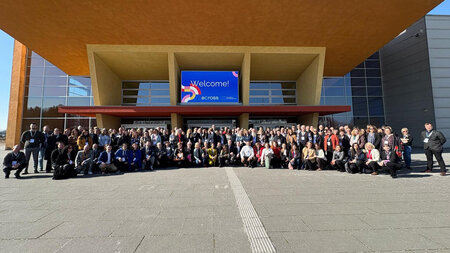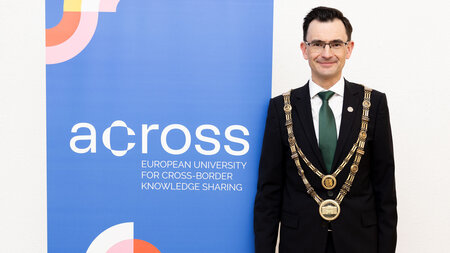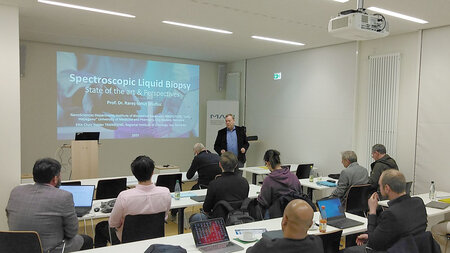Sustainable design and a more efficient operation of data centers
The European project “RenewIT” reveals new ways of more environment friendly energy supply – Chemnitz University researchers involved and results online available
-

The Chemnitz researchers Thomas Oppelt (f.l.), Prof. Thorsten Urbaneck, Verena Rudolf, and Nirendra lal Shrestha from the Professorship of Technical Thermodynamics show that servers can be used for heating. Photo: Matthias Bilz
The IT data centers located in Germany alone consume approx. 10.000 gigawatt hours (GWh) annually. This corresponds to almost one third of the annual gross electricity consumption in Saxony. And the tendency is rising. Experts predict that the growing usage of internet and cloud- services could lead to an increase of approx. 3 percent per year. Thus, the sustainable development of IT data centers requires increasing energy efficiency as well as using renewable energy sources for power supply and cooling. In front of this background, a consortium comprising of seven European organizations from industry and science joined forces and launched the project “RenewIT” in October 2013. A research group at Chemnitz University of Technology lead by Prof. Thorsten Urbaneck, head of the division Thermal Energy Storage at the Professorship of Technical Thermodynamics, had a significant share in the success of the project. Further partners are based in Spain, the Netherlands, Italy, and Great Britain. The project was funded by the European Union in the seventh framework program and was completed successfully after a duration of three years.
“In total 14 concepts on renewable energy and cooling supply were developed where we could include and advance a Chemnitz specialty – the efficient cooling supply”, says Urbaneck. The required special servers with liquid cooling were provided by the Megware Company in Chemnitz-Röhrsdorf. “As most heat is generated inside the servers the heat should be fed into district heating systems in the future”, explains the researcher a significant improvement.
In order to give many interested parties the chance to turn the research results into practice, the project partners developed an online tool for the energetic pre-design being freely available: http://www.renewit-tool.eu/ . Expert knowledge and results of extensive system simulations were transferred into simple but sufficiently accurate models for web-based evaluation of different concepts.
The most important results of the project are now available online as open source: http://www.riverpublishers.com/research_details.php?book_id=425. The authors want to push the quick adaptation of such energy efficiency measures and the application of renewable energies to teaching and practice.
Keyword: RenewIT project
Based on a holistic approach, the aim of the project “RenewIT” was to design more sustainable data centers and to reduce their energy consumption. The vision was to supply data centers almost completely (over 80%) with renewable energy. However, this aim can only be achieved with an adjusted set of measures. Thus, the industrial and scientific partners in the project involved devoted themselves to the analysis and systematization of existing data centers, available components inside the data center, renewable energy sources in Europe, and the required technologies for their supply. Furthermore, it was necessary to evaluate the operation of data centers especially with regard to the upstream supply systems and new approaches on the usage of waste heat. Moreover, the consortium worked on the development of software components for the determination and prediction of energy consumption in IT processes as well as for the optimization according to requirements for ecological operation (consolidation). Further topics and research focuses as well as involved organizations are available online.
Further information can be obtained from Dr. Thorsten Urbaneck, division manager Thermal Energy Storage at the Professorship of Technical Thermodynamics at Chemnitz University of Technology, phone +49 371 531 32463, email thorsten.urbaneck@mb.tu-chemnitz.de (Author: Lars Meese)
Matthias Fejes
14.08.2017





